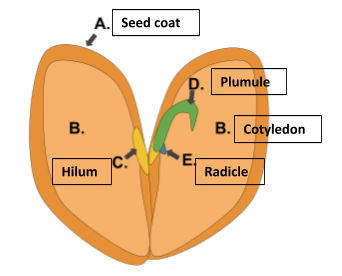Examination of Mustard Flower, Gram Seed and Maize Grain
Abstract
This practical involves the examination and comparison of the structural features of Mustard flower, Gram seed, and Maize grain under a magnifying glass or microscope. It highlights the diversity in the reproductive and storage structures of plants.
Introduction
Understanding plant reproductive and seed structures is essential in botany. The Mustard flower represents a complete flower, Gram seed is a dicotyledon, and Maize grain is a monocotyledon. This practical introduces students to their structural features and differences.
Procedure
- Take a fresh Mustard flower, a Gram seed, and a Maize grain.
- Use a hand lens or dissecting microscope to observe the external features.
- Peel the seed coat of the Gram seed to observe cotyledons.
- Slice the Maize grain to observe its single cotyledon and endosperm.
- Draw and label diagrams of each specimen.
Observation and Calculation
- Mustard Flower: Complete flower with sepals, petals, stamens, and pistil.
- Gram Seed: Dicotyledon with two cotyledons, embryo, and seed coat.
- Maize Grain: Monocotyledon with one cotyledon, large endosperm, and embryo.


20 Short Questions with Answers
- What type of flower is Mustard?
It is a complete, bisexual flower. - What is a dicotyledon?
A plant whose seed has two cotyledons. - How many cotyledons does a maize grain have?
One cotyledon. - Which part of the flower contains pollen?
The anther of the stamen contains pollen. - What is the function of petals?
To attract pollinators with their color and scent. - What covers the Gram seed?
A seed coat called the testa. - What is the endosperm?
A nutrient-rich tissue that provides food for the developing embryo in seeds like maize. - Is Gram seed monocot or dicot?
Dicot. - What does the embryo develop into?
It develops into a new plant (shoot and root system). - Name the reproductive parts of the Mustard flower.
Stamens (male) and pistil/carpel (female). - What is the function of cotyledons?
To store and supply food to the developing embryo. - Which seed shows more stored food in the endosperm?
Maize grain. - What is the role of sepals?
To protect the flower bud before it opens. - Is maize grain technically a seed or a fruit?
A fruit (caryopsis). - Which seed has visible two halves?
Gram seed. - What structure is unique in a monocot seed?
A single cotyledon and a large endosperm. - What is a complete flower?
A flower that has all four parts: sepals, petals, stamens, and pistil. - What is the role of the ovary in the Mustard flower?
It contains ovules and develops into fruit after fertilization. - Which plant part becomes a seed after fertilization?
The ovule. - What is the difference in seed coat between Gram and Maize?
Gram has a thicker, visible seed coat, while Maize has a thin, fused seed coat with the fruit wall.
5 Multiple Choice Questions (MCQs)
- How many cotyledons does a Gram seed have?
Ⓐ One Ⓑ Two Ⓒ None Ⓓ Four
Answer: Ⓑ Two - Which part of the flower contains ovules?
Ⓐ Petals Ⓑ Sepals Ⓒ Ovary Ⓓ Anthers
Answer: Ⓒ Ovary - What is the function of endosperm in Maize grain?
Ⓐ Photosynthesis Ⓑ Reproduction Ⓒ Storage of food Ⓓ Protection
Answer: Ⓒ Storage of food - Mustard flower is:
Ⓐ Incomplete Ⓑ Complete Ⓒ Monocot Ⓓ Asexual
Answer: Ⓑ Complete - Which one of the following is a monocot seed?
Ⓐ Gram Ⓑ Mustard Ⓒ Maize Ⓓ Bean
Answer: Ⓒ Maize
Tags
Grade 10 PBA Biology
